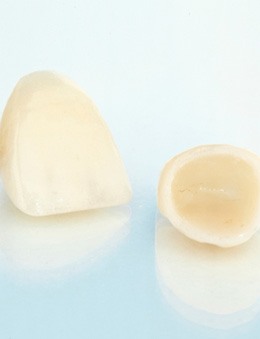Dental Crowns – Murphy, TX
Restore Struggling Dental Structure

Do you have decay or trauma that has compromised the health or strength of one of your teeth? At Murphy Family Implant & Cosmetic Dentistry, we offer dental crowns to help protect damaged teeth from additional harm. Dental crowns can shield and restore struggling dental structure while blending in seamlessly with the rest of your smile. To find out if a dental crown is right for you, give us a call to schedule your free consultation with Dr. Najari or Dr. Nguyen. We’re eager to help restore your smile!
Why Choose Murphy Family Implant & Cosmetic Dentistry for Dental Crowns?
- Top-Tier, All-Ceramic Materials Available
- FREE Restorative Consultation
- Over 20 Years of Clinical Experience
What is a Dental Crown?

A dental crown is a custom-crafted “cap” that’s made to fit over the biting surface of your damaged or weakened tooth above the gumline. This restoration can be made from a variety of different materials, including ceramic and zirconia thanks to their durability, yet natural-looking appearance. Dental crowns are generally recommended if you have one or more of the following problems:
- Broken tooth in need of additional support
- Missing tooth being replaced with a dental implant
- Tooth that is severely misshapen or discolored
- Dental bridge that needs support from adjacent teeth
- Tooth that has undergone root canal therapy
- Severe decay repaired with a large dental filling
The Process of Getting a Dental Crown

The process of getting a dental crown is relatively straightforward. It generally takes place over a few appointments. During your first one, we will take a look at your smile to ensure that a dental crown is the best option to protect your tooth from additional damage. Next, a thin layer of your enamel is removed to make room for the crown to fit comfortably in the mouth. The goal is for your crown to feel and look just like a natural tooth. That’s why we take impressions of your tooth and surrounding gumline. This will then be sent to a dental laboratory where your crown is custom crafted just for you.
In the meantime, you will be given a temporary crown to keep your tooth safe. During your next visit, your custom restoration will be adhered to the tooth using dental cement.
The Benefits of Getting a Dental Crown

There are all sorts of benefits that you can expect when you get a dental crown. Here are some of the most prominent ones:
- Comfortable
- Prevents future problems
- Natural appearance
- Customized
- Can last 15+ years
- Easy chewing
Understanding the Cost of Dental Crowns

With any kind of dental procedure, you will always want to make sure that you have a grasp on the cost and the factors that contribute to it. When you come to our office for a dental crown, we will give you an estimate of the final price, answer any questions you might have about how we arrived at that number, and help you create a plan to pay for your care while keeping your out-of-pocket costs under control.
Factors That Affect the Cost of Dental Crowns

First of all, not all dental crowns are made out of the same material. For instance, we offer zirconia crowns as well as porcelain ones. The amount you pay will vary depending on what your crown is made of.
Additionally, there’s also the question of how many crowns you’ll need to get. Obviously, if just one tooth is in need of repair, you will only need to make room in your budget for a single crown. But if two or more teeth have been damaged, then you’ll need an appropriate number of crowns to fix all of them, and each crown will come with its own cost.
Finally, any related treatments must be considered. Some patients may need to get a crown as part of the dental implant process or a root canal treatment. As such, you might have to make room in your budget for the procedure in question in addition to the crown.
Does Dental Insurance Cover Dental Crowns?

You can usually expect your dental insurance to help pay for a crown as long as it’s for restorative purposes (as opposed to being completely cosmetic). Many dental insurance companies pay around 50% of the total cost of crowns, but this isn’t always the case. You can confirm whether your plan will pay for your crown and the level of coverage they offer by getting in touch with your insurance company.
We want you to be able to take full advantage of your dental benefits. As such, we gladly take most insurance plans, and we can handle any claims that need to be filed. Please let us know if you have any insurance-related questions.
Options for Making Dental Crowns Affordable

Of course, not everybody has a dental insurance plan. Our team is aware of this and wants to make sure that you know that you have other options when it comes to paying for dental crowns. In particular, you can apply for CareCredit and take advantage of one of their financing plans. Instead of having to pay the full price of a dental crown all at once, you will be able to pay in smaller installments that are easier for your budget to handle. Many CareCredit plans have low interest, and some may even come with no interest.
Dental Crown FAQs

If dental crowns in Murphy are the recommended treatment for your weakened and decayed teeth, the team at Murphy Family Implant and Cosmetic Dentistry understands you probably have many questions. With more than two decades of experience, our dentists want to provide the clarity you need to feel confident and comfortable moving forward with any type of dental care, which is why you will find a list of commonly asked questions below. If you do not see your question below or have additional concerns, don’t hesitate to contact our office to schedule an appointment.
Why are dental crowns necessary?
The majority of cases that involve a dental crown include a decayed or severely damaged tooth. However, it is also possible that our team will recommend this type of restoration if you have a large filling that has expanded and is damaging the rest of the tooth, if you recently had a root canal or dental implant placed, or if you have a misshapen or discolored tooth you want to hide.
Can problems arise while wearing a dental crown?
Depending on the type of crown you receive, there are instances where problems can arise. From sensitivity immediately following your procedure to potential chips that develop in the porcelain to and loose or detached crown, these are all possible scenarios that can occur. Additionally, if you are unaware of any allergies, those created using metal can cause an allergic reaction to occur as well as discoloring around the tooth next to the gum line.
How long can I expect it to last?
The longevity of your crowned tooth largely depends on how well you take care of it. On average, a dental crown can last between 5 and 15 years. Naturally, wear and tear will occur over time because of daily use; however, your oral hygiene and lifestyle habits can either shorten or lengthen the lifespan of your restoration. This is why it is best to stop smoking and avoid grinding your teeth, chewing on ice, or trying to open packages with your teeth. Otherwise, you’ll be seeing your dentist in Murphy for an emergency visit.
Will the crowned tooth require special products or tools for cleaning?
Although you will not be required to purchase any additional products or equipment to care for your dental crown, it is important that you devote ample time to your oral hygiene each day. While the crown itself cannot decay, the tooth underneath can be negatively impacted if you forgo regular brushing, flossing, and rinsing. It is imperative to prevent tooth decay and gum disease from occurring and further weakening your crowned tooth.
Will dental insurance pay for a dental crown?
Most dental insurance companies provide available coverage for this type of restorative treatment. Dental crowns are a common service provided by dental professionals, and insurers know they are necessary to ensure the future health of a patient. Depending on your plan, crowns may be covered anywhere from 50-80%. Our team will be happy to work on your behalf to file any paperwork or claims to make the process as seamless as possible.
If you are uninsured, you can arrange financing through CareCredit, which provides low and no interest payment plans to individuals who qualify.
